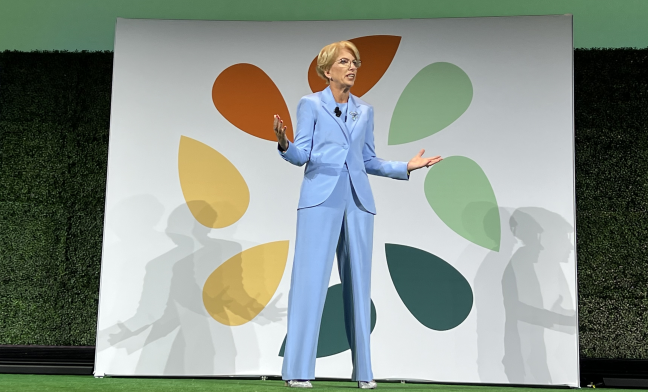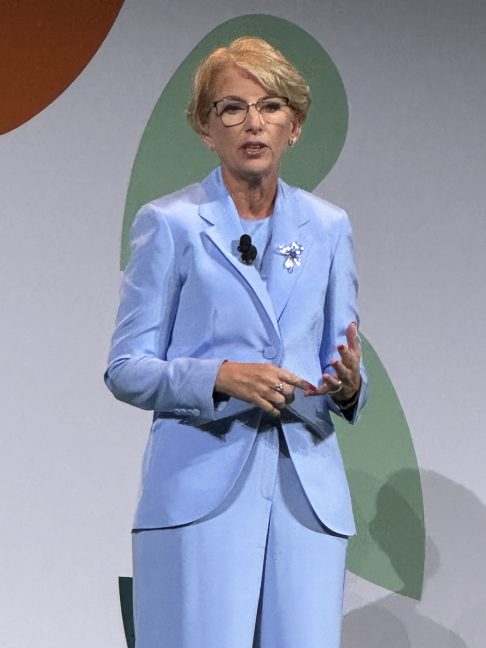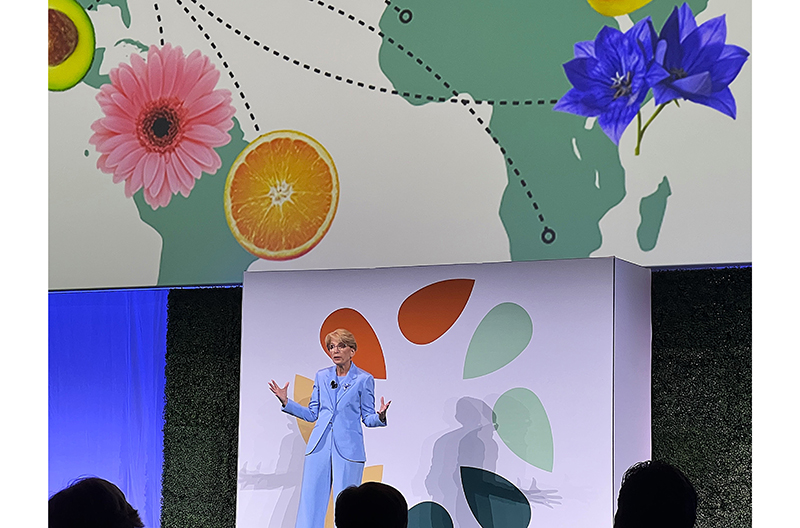Kicking off the annual International Fresh Produce Association State of the Industry keynote with a recap of various advocacy victories in 2024, IFPA CEO Cathy Burns highlighted the impact fresh produce and floral have on people, plates and the planet.
“While it’s challenging to maintain connection today, whether watching TV or scrolling social media, the reality no matter where your space is along the produce and floral supply chain – your place is always here at our table,” Burns said, in a nod to the 2024 IFPA Global Produce and Floral Show’s theme of “You Belong Here.”
Advocacy in action
A year ago, Burns called on members and those in the global produce and floral community to get more involved in advocating on industry issues and public policy. Community response resulted in the saving of the fresh fruit and vegetable benefit in the WIC program (a $1 billion opportunity for fresh produce) among others, which has reinforced IFPA’s position in public policy circles.
“It’s the ‘together’ that makes advocacy work.” Burns said. “As we see how interconnected and portable policy can be between regions, we stand ready to amplify our voices to create meaningful change.”
Technological innovations
Burns discussed the transformative impact of artificial intelligence on the industry, from AI-powered self-checkout systems to innovative packaging solutions and the importance of trust in implementing these technologies.
“When it comes to trust around AI, the World Economic Forum finds only 55 percent of employees are confident their organization will implement AI in a trustworthy and responsible way,” she shared. “While AI has likely contributed to workplace anxieties, there is a huge opportunity to move more daily work from the routine to the rewarding. The power of the conversation remains unequaled.”
Climate and sustainability
While 2024 saw many innovations in sustainability – from AI-powered beehives that manage pollinator health to bins that reduce food waste – climate change and record-warm global temperatures present a danger to the global produce and floral sector.
“As a result of global temperature volatility, food inflation could increase by 3 percent per year in the next decade due to ‘climate-flation,’” Burns said. “Insurer Lloyds found that, if agricultural innovation fails to keep pace with climate change over the next 30 years, there is a 50 percent chance of a ‘major’ global food shock.”

To help its members contend with climate challenges, IFPA launched the Fresh Field Catalyst Technology Accelerator several years ago. In 2024, the cohort was focused on climate-smart solutions for fresh produce and floral and was highlighted during the show’s expo.
During the keynote address, Burns also shared that the association has been granted observer status to the United Nations Framework Convention on Climate Change, allowing IFPA to represent the fresh produce and floral community in negotiations. IFPA VP of Sustainability Tamara Muruetagoiena will serve as the organization’s representative.
Muruetagoiena has led many of IFPA’s sustainability programs and efforts, including representing IFPA as chair of the Consumer Goods Forum Sustainable Supply Chain Initiative’s (SSCI) Environmental Working Group, which developed benchmarking environmental standards that were released mid-summer to the fresh produce and floral sector.
“Climate change is a top concern for our members, and it’s an incredible honor that IFPA’s work in sustainability and climate-smart agriculture has resulted in the association being granted this status by the United Nations,” Burns said.
“The fresh produce and floral community is part of the solution through our commitment to climate-smart agriculture practices, and we will ensure our voice is heard to influence outcomes in global forums such as the UNFCC and COP29.”
[RELATED: IFPA Officials Preview Fresh Produce & Floral Show]
Workplace dynamics
Employee disengagement and a lack of inclusivity/belonging were among the headwinds facing business leaders. Although disengagement is growing among older Millennials and Gen Z employees, Burns cited data from a global Gallup study that found that engaged managers make a tremendous impact on their teams, specifically that 70 percent of the variance in team engagement can be attributed to a manager’s leadership.
“It is essential that we continue to tackle these hard, and yes, even contentious ideas, with a clear-eyed view as to how they benefit all of you, your company and our community’s prosperity. How we create a culture of belonging will be key to attracting the best and brightest of the next generation – the talent that will drive your future prosperity.”
Global health crisis
Low fruit and vegetable intake poses a significant health risk worldwide, and IFPA aims to address this through policy and innovation, Burns said. She cited data which found healthy diets are out of reach for about 3 billion people, with another study revealing that up to 1 billion were at risk of losing access to healthy diets if a major food system shock occurs.

“By bringing our community’s voice and ideas into the broader sphere of food, medical and government entities, The Foundation for Fresh Produce will champion increased fruit and vegetable consumption for societal well-being. To drive our mission further, we will appoint a chief medical officer to advise the work of the foundation,” Burns announced.
Fight for Fresh
Citing the advocacy outreach and outcomes that will flow from the more than 70 global elections held in 2024, Burns revealed the elements of a policymaker-oriented campaign under the banner “Fight for Fresh.”
“We need to be ready to respond when our community’s outcomes will require us to be ready to respond when our importance and relevance to the world is questioned, challenged, or worse, disregarded,” Burns said.
Burns clarified that “Fight for Fresh” is not a consumer campaign but an intentional effort to break through the noise and grab the attention of lawmakers and regulators when the moment is right. An early example of this was the WIC campaign in early 2024 that saved the fresh produce benefit; another was the quarter-full produce gift boxes lawmakers received during the June 2024 Washington Conference, which drove home the point that without farm labor reform, this is what future production will yield.
Yet another is the lawsuit IFPA and other leading ag organizations have filed against the U.S. Department of Labor that legally challenges the department’s most recent H-2A rule in federal court on the belief it is “unnecessary, unlawful, outside the agency’s scope and overly burdensome to agricultural employers.”
“The size and scope of the global fresh produce and floral community alone gives us immense influence. It’s time we fully tap into that,” Burns said.
“At the end of the day, when we come together as a community united by voice and purpose, we don’t just create a profound sense of belonging; we ignite a powerful force of togetherness. We do not go into advocacy lightly. Fresh produce and floral is absolutely, undoubtedly, 100 percent worth fighting for.”

